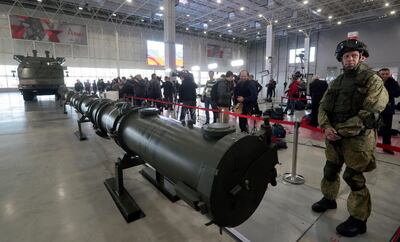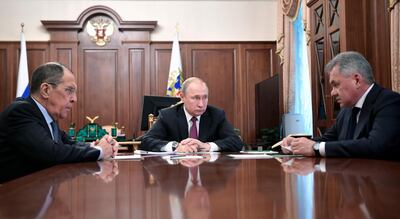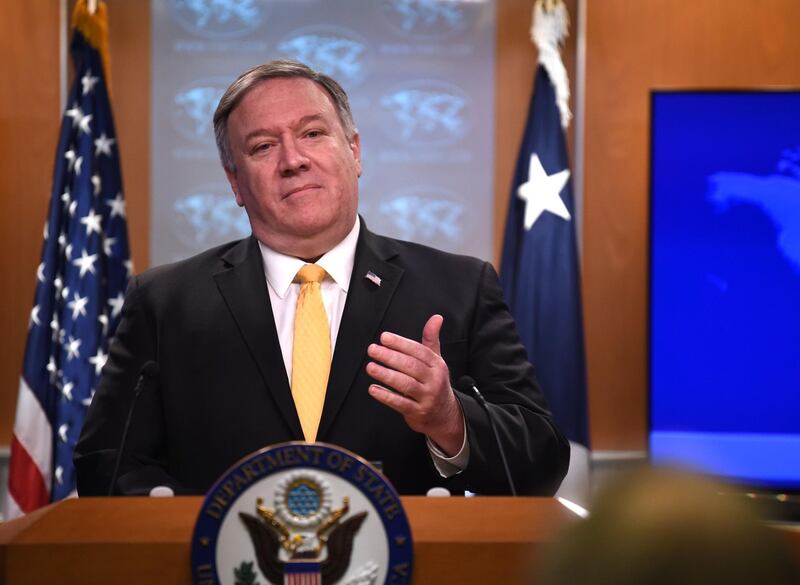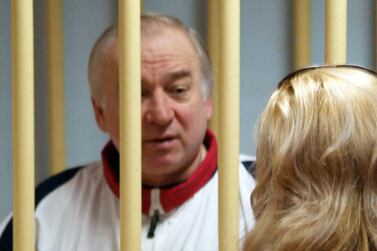Russian President Vladimir Putin has followed his US counterpart in withdrawing from a trailblazing Cold War arms control pact that limited short and medium-range ballistic missiles.
American President Donald Trump said on Friday that he would withdraw from the 1987 Intermediate-Range Nuclear Forces Treaty agreed by Ronald Reagan and Mikhail Gorbachev.
Mr Putin then said on Saturday that he too was suspending participation and that Russia would start work on new missiles, including supersonic ones, and told ministers not to initiate disarmament talks with Washington.
“The United States will suspend its obligations under the INF Treaty and begin the process of withdrawing from the INF treaty, which will be completed in six months unless Russia comes back into compliance by destroying all of its violating missiles, launchers and associated equipment,” said Mr Trump.
The deal eliminated all land-based ballistic and cruise missiles and launchers with ranges of between 500 and 5,500 kilometres. The process of dismantling or removing 2,692 missiles was completed by 1991.

In 2014, the Obama administration said that Russia had tested a ground-launched cruise missile that broke the terms of the agreement – a projectile the Russians designate 9M729. Russia denies that the missile can fly far enough to violate the deal.
Secretary of State Mike Pompeo reiterated the assertion on Friday, saying Russia violated the treaty for years “without remorse”. Mr Trump has been widely expected to scrap the deal since taking office.
“Russia's violation puts millions of Europeans and Americans at greater risk, it aims to put the United States at a military disadvantage,” he said. But Mr Pompeo and Mr Trump have left the door open for a potential reconciliation if Russia was to “change course from a pattern of destabilising activity”.
Moscow has strongly denied any breaches and accused Washington of making false accusations in order to justify its pullout.
The announcements started a 180-day timer to complete withdrawal from the deal unless more talks with Moscow suspend the process.
The Russian president on Saturday called for weapons inspectors to tour US sites to ensure their own compliance with the INF. In 2017, Barack Obama ordered the research and development of a US intermediate missile – the deal allows planning but not flight tests. Russia contends that the US has also violated the deal in defence tests and an American vertical launch defence system that has been deployed in Europe.
While the move was welcomed by Nato, which said America’s allies “fully support” the decision, the EU expressed concern even though it supported the underlying thinking.
“What we definitely don't want to see is our continent going back to being a battlefield or place where other superpowers confront themselves – this belongs to a far away history,” EU foreign policy chief Federica Mogherini told reporters in Romania.
While the deal was signed only between Moscow and Washington, its importance to Europe has been crucial – largely keeping Russian and American nuclear missiles out of Europe for three decades.
The collapse of the INF Treaty has raised fears of a repeat of a Cold War showdown in the 1980s, when the US and the Soviet Union both deployed intermediate-range missiles on the continent. Such weapons were seen as particularly destabilising as they take only a few minutes to reach their targets, leaving no time for decision-makers and raising the likelihood of a global nuclear conflict over a false launch warning.
“The INF contributed to the end of the Cold War and constitutes a pillar of European security architecture since it entered into force 30 years ago,” a spokeswoman for Ms Mogherini said last October.
Ms Mogherini’s sentiment about a new arms race has been echoed by Mr Putin.

He ordered the development of new land-based intermediate-range weapons, but emphasised that Russia would not deploy them in the European part of the country or elsewhere unless the US does so.
"We will respond quid pro quo," Mr Putin said. "Our American partners have announced they were suspending their participation in the treaty and we'll do the same. They have announced they will conduct research and development, and we will act accordingly."
Mr Trump has been vocal about building new nuclear missiles and modernising the country’s arsenal. A major issue hanging over the US-Russian deal for some US policy experts is the rise of China. Some officials have said that an unconstrained China is developing new generations of missiles while Washington and Moscow are held back, giving Beijing the military advantage.
Mr Trump said as much on Friday, saying “first of all you have to add countries”.







